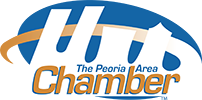The Peoria Area Chamber of Commerce has taken a position Against the proposed Graduated Income Tax Amendment on the Nov. 3, 2020 Ballot.
Valued Chamber & Community Members,
The Peoria Area Chamber of Commerce Board of Directors, on behalf of its members, voted to oppose the proposed Graduated Income Tax amendment on this year’s ballot. While we acknowledge the revenue shortfalls in the Illinois state government and remain committed to supporting the many needs of our community, we simply cannot support this proposed amendment on the grounds that it will hurt our small businesses, large employers, and the broader business community. This additional tax burden will not only impact business owners but employees as well; this amendment will implement an immediate tax, offers no limits on the amount of tax, and allows the government the ability to implement future additional income taxes at any time without accountability provisions in place for the usage of these added revenues. The Peoria Area Chamber proudly joins other Chambers of Commerce in our state, the Illinois Farm Bureau, and many other business groups as a part of the “Vote NO on the Progressive Tax Coalition.”
We take our responsibility to serve our members seriously and have carefully considered this decision. We are confident that standing up for our members against this amendment is the right decision, and we will continue to advocate for policies that will strengthen the business climate in the Peoria region.
For more information on why we believe this amendment is bad for our members, see the Chambers Against Tax website.
We’ve also included a video from the Illinois State Chamber of Commerce, which identifies the key challenges with this proposed amendment, specific to the needs of local Chambers of Commerce.
Thank You,
Joshua Gunn
President and CEO
Peoria Area Chamber of Commerce and CEO Council
- PRO: House Speaker Michael Madigan (D-22): “Middle-class families bear too much of the burden under the current tax system, and a Fair Tax will enable us to make the wealthy pay their fair share to balance the budget and invest in critical resources like education and health care — all while providing relief for 97% of taxpayers.”
- PRO: Trisha Crowley, president of the League of Women Voters of Champaign County: “In Illinois, the bottom 20% of wage earners currently pay almost twice as much of their total income for state and local taxes as the top 20%. This is an unjust burden on our poorest residents. As the income gap between rich and poor in the US continues to grow, taxing our highest earners at a rate proportionate to their increasing concentration of income growth could also make a real difference in addressing the state’s well-known fiscal crisis. The proposed amendment will not itself change the current rates, but it will allow for them to be graduated. ”Illinois’ current tax system unfairly benefits millionaires and billionaires and this amendment will set things right for middle-class and working people. Currently, it is unfair that billionaires pay the same tax rate as regular people. Voting “yes” on the amendment means that the State will enact a new tax structure where only those making above $250,000 a year will see their taxes go up. This amendment is simply upgrading Illinois’ old tax system to a graduated system which is how the federal government and the majority of other states do it.”
- CON: Illinois Chamber of Commerce: The Illinois Chamber of Commerce released a statement opposing the graduated income tax amendment, which included, “Illinois’ current flat rate income tax is inherently more fair than a graduated income tax since everyone pays the same rate and tax increases uniformly impact everyone. A flat rate tax does not promote divisive class warfare rhetoric or purposefully attempt to re-distribute income according to a subjective fairness standard. A flat rate tax requires all taxpayers to vigilantly stand guard against excessive government spending.”
- CON: Sen. Paul Schimpf (R-58): “Today’s Senate action continues to ignore the reality that Illinois politicians have an insatiable desire to spend more money and expand the size of government. Changing our taxing structure, without providing a means to limit spending or make it more difficult to raise taxes in the future, solves nothing. In fact, this plan will most likely only lead to more tax increases and higher spending in the future.”
- Ralph Matire is the Executive Director for the Center for Tax and Budget Accountability. Ralph will present arguments in support of the ballot initiative.
- Leslie Munger is the Former Illinois Comptroller and Deputy Governor. She is a board member of the Illinois Chamber of Commerce. Leslie will present arguments against the ballot initiative.
